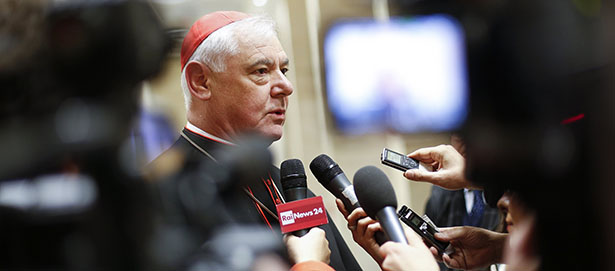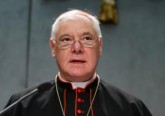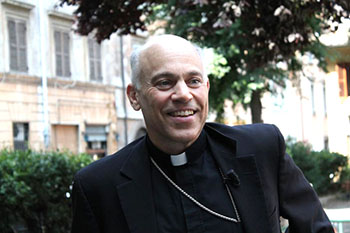Vatican official rebukes U.S. nuns’ group for ‘fundamental errors’

By Francis X. Rocca Catholic News Service
VATICAN CITY — Using what he acknowledged was unusually “blunt” language, the head of the Vatican’s doctrinal office rebuked officers of the Leadership Conference of Women Religious for honoring a Catholic theologian whose work was judged “seriously inadequate” and for promoting futuristic ideas he described as “opposed to Christian revelation.”
Cardinal Gerhard Muller, prefect of the Congregation for the Doctrine of the Faith, made the remarks April 30 in an address to the presidency of the LCWR, a Maryland-based umbrella group that claims about 1,500 leaders of U.S. women’s communities as members, representing about 80 percent of the country’s 57,000 women religious.
The text of Cardinal Muller’s remarks was posted on the congregation’s website.
In 2012, the Vatican announced a major reform of the LCWR to ensure its fidelity to Catholic teaching in areas including abortion, euthanasia, women’s ordination and homosexuality. The Vatican appointed Archbishop J. Peter Sartain of Seattle to implement the congregation’s “doctrinal assessment,” by providing “review, guidance and approval, where necessary, of the work” of the LCWR.
LCWR officials have characterized the assessment as a “flawed process that lacked transparency,” and the disciplinary measures imposed by the Vatican as “disproportionate,” saying they compromised the organization’s ability to fulfill its mission.
At the April 30 meeting with LCWR officials, Cardinal Muller voiced “increasing concern” about the LCWR’s promotion of the “concept of conscious evolution” in various publications and in the “directional statements” of some member congregations.
Conscious evolution is a set of ideas developed in the writings of Barbara Marx Hubbard, who addressed the LCWR annual assembly in 2012. Hubbard’s website describes the concept as “part of the trajectory of human evolution, the canvas of choice before us now as we recognize that we have come to possess the powers that we used to attribute to the gods.”
According to the cardinal, the “fundamental theses of conscious evolution are opposed to Christian revelation and, when taken unreflectively, lead almost necessarily to fundamental errors regarding the omnipotence of God, the incarnation of Christ, the reality of original sin, the necessity of salvation and the definitive nature of the salvific action of Christ in the paschal mystery.”
“Conscious evolution does not offer anything which will nourish religious life as a privileged and prophetic witness rooted in Christ revealing divine love to a wounded world,” he said. “The Gospel does! Selfless service to the poor and marginalized in the name of Jesus Christ does!”
Cardinal Muller also said he was saddened by plans to give a major award at the group’s annual assembly in August to St. Joseph Sister Elizabeth A. Johnson. In 2011, the U.S. bishops’ Committee on Doctrine criticized one of Sister Johnson’s books as containing “misrepresentations, ambiguities and errors” related to the Catholic faith.
The LCWR’s award to the theologian “will be seen as a rather open provocation against the Holy See and the doctrinal assessment,” the cardinal said. “Not only that, but it further alienates the LCWR from the bishops as well.”
The prefect said he would not prevent Sister Johnson from receiving the award, but that the Vatican expected LCWR officials henceforth to seek Archbishop Sartain’s advance approval of “invited speakers and honorees” at major events.
“In the end, the point is this: The Holy See believes that the charismatic vitality of religious life can only flourish within the ecclesial life of the church,” the cardinal said. “The LCWR, as a canonical entity dependent on the Holy See, has a profound obligation to the promotion of that faith as the essential foundation of religious life.”
In a written statement responding to a reporter’s inquiry, LCWR officials said the prefect’s “remarks were meant to set a context for the discussion that followed. The actual interaction with Cardinal Muller and his staff was an experience of dialogue that was respectful and engaging.”
—
Contributing to this story was Cindy Wooden at the Vatican.
Story posted May 6, 2014













